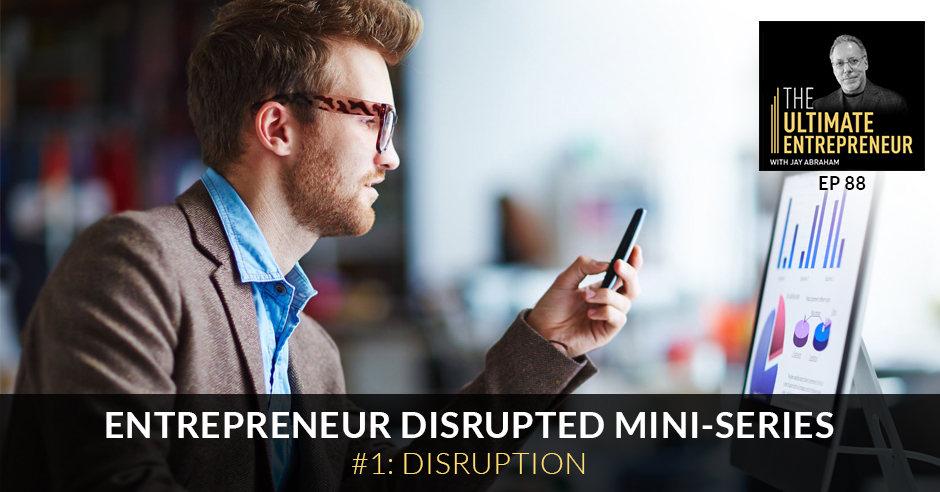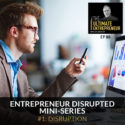
Welcome to the very first installment of the Entrepreneur Disrupted Mini-Series! These episodes will be bedtime stories for entrepreneurs: stories that will inspire business owners to think differently, to act differently, to transact differently. To embrace your opportunity and your possibilities from fresh new slants and vantage points no one else you compete with sees. Our goal every session, every addition, is for you to learn how to out-think, how to out-market, how to out-strategize, how to out-contribute, how to out-negotiate, how to out-value, how to out-compete, and thus how to out-earn your competition. Get ready because we’re going to do the first series of Entrepreneur Disrupted with my dear friend and super achiever, Bullet Proof Coffee maven, Dave Asprey – also the star of his own Bullet Proof Radio. I think you’re going to find these perspectives so unique and so actionable and so compelling that you can’t help but implement your next plan differently!
—
This is Jay re-introducing to you the re-launch of The Ultimate Entrepreneur. I feel a lot like Elon Musk getting ready to launch a successful spacecraft that comes back and I can reuse again because I spent time away from this program, thinking deeply and meaningfully, about what would add even greater value, greater dimension greater action ability, greater profitability to each and every business owner, entrepreneur, professional or aspiring who is dedicated to the program. Here’s what we came back with, an all-new re-launch that is going to be I think brain shatteringly powerful. It’s going to change your paradigm. First of all, we’re going to start with a mini-series that is amazing because I got one of my clients, Dave Asprey, Founder of Bulletproof Coffee and is the star of The Bulletproof Radio Show who happens to be a fabulous former venture capitalist, private equity expert, technologist, master at starting and growing businesses and an investor, to do an entire series of specially-focused business oriented sections between he and I which we’re calling Entrepreneur Disrupted. It’s designed to shake you up. It’s designed to challenge your reality. It’s designed to break wide apart your glass ceiling. We’re starting with the first one today but that is only the beginning.
The new version of Ultimate Entrepreneur is going to be overflowing with powerful perspectives on how to look at your business, your market, your competitors, your opportunities, so differently than anyone else that it gives you an absolute premier advantage. You’re going to learn how to be pre-eminent, preemptive and powerfully prominent. We’re going to do sessions taken from my travels where I’m working on the front lines of capitalism with enterprises of every kind. I’ll share distinctions, I’ll share problems we solved, I’ll share insights, opportunities you can translate, apply, adopt. We’re going to be interviewing titans, moguls, empire builders, and high performing entrepreneurs who are on the verge of becoming that. Not just the run of the mill but people who are really worthy of you dedicating your biggest and most precious resource to your time, your opportunity costs, your trust. We’re going to be also sharing actual answers, problems, questions, solutions, and opportunity mining I am doing all over the world.
For example, I just got back from doing a sold out session in Paris with 600entrepreneurs. Then I went to Amsterdam with Tony Robbins, 600 entrepreneurs for one session. Tony and I did a whole day together of what Tony calls pitch and catch and we’re going to see how many of those sessions we can borrow and share. Then I went to Vienna same thing; 650 Italian entrepreneurs, nobody spoke English, all translation. I’m getting ready to go to Cancun and do a session, and we’re going to go to China and do five sessions, then Tokyo. You’re going to be coming along for the experience. We’re also going to do every session very shortly with what I’ll call bedtime stories for entrepreneurs; stories that will inspire business owners to think differently, to act differently, to transact differently. To embrace your opportunity and your possibilities from fresh new slants and vantage points no one else you compete with sees. Our goal every session, every addition, is going to be to teach you how to outthink, how to out-market, how to out-strategize, how to out-contribute, how to out-negotiate, how to out-value, how to out-compete, and thus how to out-earn your competition. Get ready because we’re going to do the first series of Entrepreneur Disrupted with my dear friend and super achiever, Bullet Proof Coffee maven, Dave Asprey, and the star of his own Bullet Proof Radio. I think you’re going to find these perspectives so unique and so actionable and so compelling that you can’t help but implement differently. Let’s begin.
Listen to the podcast here:
Entrepreneur Disrupted Mini-Series – #1: Disruption
I’m your host Dave Asprey and I’m with Jay Abraham. If you don’t know about Jay’s work it’s been a lifetime of incredibly impactful marketing stuff. Jay and I have been friends for a while. Jay’s been helping me with my company Bulletproof. We decided that if either one of us had the set of knowledge that we’ve accumulated in the School of Hard Knocks when we were 20 years old starting out or thirty years old, working on being entrepreneurs that it would have cut a lot of corners off ours. It would have actually saved a lot of time and effort. We decided to a podcast for a couple reasons. One is to give back to you so you can learn how to be a more effective entrepreneur or you want to start a company and you just don’t feel like you have the background or know how to think or teach how to think about being an entrepreneur, or maybe work for an entrepreneur and getting inside the head of the people you work with is a really good idea. Finally, if you’re married to an entrepreneur, for God’s sake listen to the show because you’ll certainly understand something about the insanity that comes with being an entrepreneur and the things that we think about that normal people don’t.
Jay is one of the more interesting guys when you just look at incredible breadth of business history. Forbes named him one of the top five executive business coaches in the country. Most recently in February of 2016, Success Magazine said that he might be the finest marketing mind alive on the planet. Stephen Covey says he’s one of the best business minds he’s ever met. Tony Robbins says, “Jay knows more ways to make more business and more diverse industries, more money with less time, effort, risk, than almost any other business building expert he’s ever met.” In fact, if you watch Shark Tank, Daymond John, one of the hosts, calls Jay Abraham his most powerful mentor ever. This is what we’re bringing to the table for you. Jay’s had so many successes. One of his more notable ones is one of his clients went from $300,000 in revenue to $500 million in eighteen months. When Jay was running Entrepreneur Magazine, he doubled, redoubled and then re-doubled again Entrepreneur Magazine in nine months. There’s a huge list of career achievements that he’s had and he basically agreed to do the show for free. I’m doing the show for free too, we’re giving you all of this. That’s really why I’m here. Jay, tell me a little bit about why you’re here.
It’s a mutual admiration society but it’s with the most wonderful and benevolent intentions. First of all, I’ve been involved with Dave for a couple years and I’ve never met anyone who has elevated his sense of understanding. Not just of purpose but of really contributing to the betterment of people’s lives now and in the future, number one. Number two, he’s known in your industries. Men’s Fitness for example, say he’s the world’s most famous bio hacker. He’s a founder of a really successful startup that you probably all know, Bulletproof. Unless you’ve been living under a rock, you probably heard of his creation Bulletproof Coffee or perhaps you’ve read his New York Times monster bestseller Bulletproof Diet. You probably don’t know this about Dave but this is one of the driving reasons before he became a coffee magnate, Dave’s career was in Silicon Valley where he helped bring multiple disruptive technologies to market. He’s got a history of understanding, executing, introducing, and manifesting incredible disruption that transformed in the most positive manner, all kinds of aspects of business and consumer, basically life styles and conduct. He was a co-founder of a team that grew to 1,500 people in three short years, and one of the fastest growing tech startups, Exodus Communications. He made $6 million at 26 and lost it at 28, which is a great lesson and he’s worked on Sand Hill Road for a major Sand Hill VC, Trinity Ventures.
When he and I started really comparing notes, we realized that there were profound ideological, methodological, philosophical, purpose-driven compatibilities but also there were great complements. I come at it more from I would call it the marketing revenue positioning strategy, competitive advantage side. He’s very masterful all that but very, very, very focused on operations on quality of culture, on basically having the right people for the right job, for the right reason, and making them all unified. I should probably say that in all modesty I’ve been involved in 465 unrelated industries on a worldwide basis probably 50,000 success stories. What I’ve been exposed to are tens of thousands of different ways to think outside the rigidity and the linear and the conventional capacity of the people you compete against. I’ve learned better ways to be strategic, better ways to be a marketing master, better ways to basically compete, better ways to start a relationship, better ways to improve the size of the transaction, better ways to sustain revenue, better ways to use outside resources in other people’s access without spending money to grow a business. I have an enormity of knowledge and we realize there are so many people that need it.
Most entrepreneurs unintentionally, unknowingly and undeservedly limit, restrict and constrain the size of the business as they could be building the number of loyal and enthusiastic buyers they could be serving, the size of the sales, the frequency of the sales, the number of high quality referrals that could be generated each and every day. Not because they don’t want those, they just don’t know how to get them. They work so hard and I’ve been privileged to see geometric leverage in probably 50 elements of the way a business operates from the competitive revenue, marketing, selling, interactive prospect client aside. Our belief is we can invest a new knowledge, experience, context, explanation, understanding, that will save you time, shorten the learning curve, preserve your capital, enhance your self-confidence to become a truly profound disruptive entrepreneur at the highest level of contribution and value creation. I think Dave’s mind is exquisitely brilliant and I like to be associated with people who are smarter than I am.
I’ve been thinking about doing a business podcast or a business blog for a very long time. The two areas that I spend most of my time are hacking human performance and that’s what Bulletproof is all about. If you already listen to Bulletproof Radio, I’ll keep interviewing people and I’ll keep doing what I do over there. Bulletproof is my company for maximizing human performance. What I wanted to do here and what you were really spark for when you said, “Dave, maybe we should do something. Let’s record some of this,” is I wanted to give back on the entrepreneurial side. I’m not going to talk about the things that you’re used to me talk about if you already know my voice. What I’m going to talk about is what I think about during the day running a company, what I’ve learned making big mistakes in Silicon Valley, losing $6 million really does teach you something, working for a paycheck without a savings account for years after doing that also teaches you something. I’ve been fortunate to work with a bunch of different startups, always going up against incumbent big players and usually disrupting them in different industries, which is actually the way my brain is wired.
What you get out of listening to this is not marketing advice; frankly, Jay has a ton of really good marketing advice. There are tons of radio shows that will teach you basic things like you how to do marketing, how to do marketing better. In fact, some of the guys who run those are good friends. Those are amazing shows and this is not the intent to teach you how to be a better marketer. Check out Joe Polish’s I Love Marketing podcast. I hang out with Joe on a number of his genius network. In fact, I spend a lot of time every year with leading entrepreneurs, people who are more successful than I am, so I can learn from them and just get some of that energy and then bring it back to my own company and my plans. This is not the show if you want to start a company in a few hours each week and go live in the Bahamas. There are lots of good shows for that too. This is how you want to start a company and you want to put your all into it and you want to be efficient and effective and grow it, or if you have a company and you want to grow it faster or potentially you know that you work for a company that’s driven by an entrepreneur.

Real entrepreneurs at high impact companies have different brains. We have a different view of the world. We’ll talk about that but we’re also going to get into really specific things like how do you know much to pay a new employee when you’re just getting started or when you’re already running? Should you give him a bonus? Should I give him a bonus? Do you give them equity? How do you negotiate? Should your company be distributed or centralized? We’re going to go through this long series of questions that entrepreneurs should be thinking about and may think about. Oftentimes we just are so busy that we make these decisions that have huge long-term implications for the company but we don’t have time or knowledge or context to think about them. We’re going to talk about 60 of these show topics identified right now. Jay and I are sitting down and we’re going to say, “What would I do?” This new business show, Entrepreneur Disrupted, it’s actually the same thing, same motivation, that made me start Bulletproof. I wish someone had told me this when I was younger. It’s my great hope that you’ll get some strong value out of this. Hoping is good but planning is a little bit better on top of the hope. Basically, I want to teach you to be a more efficient, more effective entrepreneur in less time. I don’t want any money for doing that. I just wish someone had told me this. If this changes your business radically, just do me a favor, tell me. That’s the payback for me. Jay haven’t asked that but I already know that’s a payback for him too. Jay, what are your motivations here?
There are three forms. One is I started out in the business world behind the scenes, masterminding and strategizing rapid business growth for people who deserved it. By that I mean they were making a difference and they could make a difference in their field. I ended up for a while being very, very, very big factor in teaching entrepreneurial growth and strategic growth around the world. I still do it but it’s not my first love. I operate with 40 or 50clients right now in the biggest broadest spectrum of real capitalism imaginable but I have an archival creation, collection that can help so many. Frankly, most people can’t or won’t afford me but I can help them and it comes back. Number two, if we help all of you be better and not just be better money makers but better value creators, better developers of your talent, better connectors to your market, the profound compound implications are incomprehensible. It’s our great honor, pleasure and privilege to connect and invest massively our two minds as much of my resources as I humanly can. We’re not trying to get anything back other then sell you on how much more is possible from your life investment in your business from your day, from your week, from your actions, activities, investment, team, opportunities interactions that’s my motivation.
This is our first episode with real content. We’re going to talk about what disruption is and why you’ve got to build it into your business model and an even a little bit of how to do it. Disruption is something that a lot of people vaguely can define. You might not know that the term was identified by a gentleman named Clayton Christensen back in 1995, which is twenty years ago. I’ve had disruptive technology in my job title at Silicon Valley almost every time, because my job was to see what was coming as a futurist, and to figure out how to take advantage of this. If you’ve never had the chance to read Clayton Christensen’s books on disruptive innovation, you owe it to yourself to do that. His most famous book, The Innovator’s Dilemma, talks about how railroads disrupted previous types of travel and goes all the way up to the most fascinating thing, the hard drive industry. You have these billion-dollar companies cruising along, a small change of technology comes along and eighteen months later, a little startup that everyone ignored is buying the billion-dollar companies because they did it better and faster. Over the last twenty years, the types that technologies that I worked to create, cloud-computing, very high-performance networking that reaches everyone in the planet, have radically changed your ability to start a disruptive company. The speed of disruption is reaching an area where I never would have imagined. To be perfectly honest, I’m perfectly good at imagining this.
You can literally start a company, like Uber, and completely disrupt the taxi industry; by the way that absolutely deserves disrupting. When you do that, you can do it in such a short order of time that it’s crazy. Almost everyone who dreams of starting a company or who runs a company would love to disrupt something but they might not really know that the definition of disruption is about creating a new market and a value network that disrupts the existing ones so that you disrupt the leaders and the alliances. You basically drop a bomb on something that was done wrong. If you are going to disrupt things, you really want to have that hackers’ mindset that says, “How can I break this? How is it done wrong? What are the annoyances that I can remove?” Jay and I sat down and we talked about several different kinds of disruption that we are going to cover on this show. A lot of the times really we’re not going to talk about the big disruptive strategies because there are lots of ways you can do that. We’re going to talk about what do you have to do operationally in order to be disruptive? What do you have to do in order to support your big disruptive goal as an entrepreneur? What are the daily struggles, the daily things that you’re going to think about? We’re going to teach you how we think about them.
The four kinds of disruption that we’ve identified there are around like disruptive technologies themselves, where you actually do something better. This is the classical, “My processor is faster and smaller and uses less power than yours therefore you’re screwed.” This happens really rapidly and it’s a lot of fun. The second one though where we’ve seen a lot of distraction in the last ten years is around service disruption. With service destruction, this is classical Airbnb and Uber and lots of other completely failed disruption models. I haven’t really seen a big winner in the disrupting laundry but I think everyone would like to see one. It’s just hard and it may actually be a technology problem.
There’s also industry disruption and this is where I like to play. Bulletproof’s mission is to disrupt Big Food. I’m tired of companies making cheap crap that makes people sick. The way I focus on that kind of industry disruption is that you can either change demand or change supply. With Bulletproof, what I’m working to do there is changed demands. We’ve had record breaking 40 years highs in demand for butter, not just butter but grass fed butter. There have been national shortages of it. Bulletproof Coffee drives some of that. The reason for that is people are learning that some kinds of butter are different than others, which in turn drives changes in supply because now there’s huge demand for organic grassland to feed cows. I think there are environmental effects too. Disrupting a whole industry because they’re doing it wrong is cool and that is neither technology disruption nor services disruption. It’s industry disruption. The final thing that I’m maybe most excited about in this show is to talk about the personal disruption that happens to allow you to be an entrepreneur who thinks exponentially. I’ve learned from some of the very best people how to do this work on myself. I’ve done a lot of neural feedback and things like that. I’ll talk about the psychology of entrepreneurship as best as I understand it. The entire time in the show, I’m going to do what I’m doing right now which is saying, “Jay, based on your entirely different set of expertise across a much broader set of industries, what’s your take on disruption?”
My approach background in history is this. I started as an industry job transient. I went from one industry to another industry to another because I was very young, I had no negotiable skills and I got stuck only getting paid for what I produced. After about ten different disparate industries, I realized that people in industry one had no idea or clue how people in history two, three, four, five, thought about everything from strategy, revenue models, access, market, vehicles, competitive positions. I was able very quickly to borrow synthesis from multiple industries and create hybrids that I was able to apply to one industry after another because most industries think, act and transact plus or minus about 20% as much as better or worse than everybody else. Then as I progressed, I started being taught about leverage. Not the kind of leverage where you go out and buy an asset or piece of equipment or hire people with the hopes that the cost will pay off and you’ll either get a greater yield or it will appreciate and you can sell it. Impact points, leverage points, misunderstood, not recognized, under-utilized, under-performing within all of the revenue competitive elements. I realize there was profound geometric disruption that you could create. Then I realized that what are we paid in the competitive world? We’re paid to think differently than our competitors, differently about the client relationship, differently about the outcome, differently about their experience, differently about how to either provide, produce or deliver.
I started thinking about innovation. I come from a less innovative place than Dave, but that’s why I think we’re a great match. I realize that innovation to me, my definition, is it can be driven by technology. It’s really the ability to bring a greater benefit, advantage, protection, enrichment, entertainment, enhancement, a reward to the market, than they’re getting now, and could be more expensive, less expensive, depends on where you’re doing it, but in a way where they so clearly recognize it, they’re eager to pay you, and you alone. Next I realized, you’re paid to think. You’re paid to think better than your competitor. You’re paid to think about the totality of everything in an organized, integrated ecosystem. Most people think of leverage as dangerous. I think of leverage differently, like good and bad cholesterol. You can have too much bad cholesterol and you’re dead, but if you have enough cholesterol, it counts. I look at all the impact points which cost no more money, take no more time, required no more people, require no more capital, but can outperform their current yield by orders of magnitude, and that on their own can be arithmetically significant but combined, produce geometric or exponential gain. There’s a ton of it that most people never see.
I think our combination is going to be very stimulating and it will be very broadening of your paradigm. If you’re paid to think, then you’ve got to be able to use more. Most people have 24-plus hours in the day unless they’re remarkable. Most people don’t have that big of intellectual advantage. Most people don’t even have that much of a capital advantage. If you don’t have all these advantages, what’s the one advantage you have using your mind many times more, strategically productively? We are in total alignment because Dave has dedicated his Bulletproof life to that. I’ve dedicated my higher performing life to it, the convergence and the convection pointer that whatever the word is perfect for this. We think together, “We’re going to blow your reality window wide open to how much more is possible for you, from you.” There’s a famous old quote by Peter Drucker, “If you’re not constantly committed daily to make what you, do how you do it, who you do it for, why you do it, where you do it, outdated, antiquated and replays, you can rest assure there are hundreds or thousands of people who’ll do it to you and for you.
There are a few things that stand out for entrepreneurs. When you really dig in on disruption, you realize that the majority of disruption isn’t the entrepreneur who sat down and said, “I’m going to do ten years of R&D in my garage and I’m going to come up with this amazing new technology.” There is that kind of disruption where you just come out with a new extremely cheap thing that people buy who would never buy the expensive thing. The really innovative stuff lately has quite often been normal existing, off-the-shelf technology that’s put in new combinations to disrupt a value network. A value now is one of those terms that you probably don’t even hear about. We don’t talk in that kind of language. Basically the way your industry is not for works. If you map out the system of the industry, what companies deliver what to who, how often, where, why, how? If you look at that as a system and you just close your eyes and draw a big picture of it or maybe you white board it, if I wanted to break that system, I wanted to make it come to a screeching halt, where would I break it? That’s oftentimes one of the leverage points.
I really am trained in artificial intelligence and computer information systems, I studied those. I studied Computer Science. When you see everything as a system, it becomes really obvious. I will go back to Uber; the system of getting a ride somewhere. You could rent a car, you could buy a car, you could hitchhike and you could get a taxi. Each of those, if you map out, there are many different steps that are involved. You go, “Which of these are annoying and which of these, if it doesn’t work, really pisses off customers?” What pisses off customers is when you call a taxi and it’s a no-show for half hour. When you get in a taxi and there’s no leg room because they have some big barrier in there and they’re annoying you with ads and it smells like ham sandwiches. All of those suck and that means it’s right for disruption.
Where you can benefit from this idea of disruption is looking at the value chain. Here’s the uncomfortable truth around disruption. Very few disruptors are industry veterans unless you’re talking about these technology disruptions where you’re going to go out and build a new a new chip, a new system, a new piece of tech. There is usually someone from outside the industry. Classical example here, what business does Elon Musk of PayPal have making electric cars and spaceships? None, if you believe the old way of doing things. If you believe in disruption, he was like, “I’m going to map out these other industries. I’m going to figure out what’s going on, what’s stupid and burning gas, and all the other things that are stupid. I want to do a different way.” There’s always a certain amount of ego and admission to change the world that comes when you do that. I would suggest for you instead of saying, “I want to start a company in an industry that I know really well,” take what you know from your industry and your experience and say, “What other problem can I solve with that mindset?”

I do walk the talk here when I came out with Bulletproof upgraded coffee beans. If you know the story, I have a different process for making green coffee that’s validated by lab testing and the goal is make coffee that didn’t make you crash. I came out with this. I published all the science behind it, about why I did it. I didn’t tell people exactly how we did it; that’s what we call a trade secret. The result has been many people saying, “Dave, I had to quit drinking coffee but when I drink yours, I feel good.” The same thing, I did quit drinking coffee. There’s my own annoyance with coffee. What happened there is I started out by approaching a market that was not addressed by coffee. Coffee companies are like, “Coffee is coffee. It either tastes good or it doesn’t taste good and it’s cheap.” I’m like, “It’s really about how coffee makes you feel.” I found a market, I don’t know how big it was, of people who felt crappy when they drink coffee. People crash when they drink coffee. It’s a big market, and I’m driving awareness of that and there are reasons for it, that in and of itself is disruptive.
One of the first critics of Bulletproof came out and said, “Dave Asprey simply can’t have done this because he’s not from the coffee industry. There’s no way that an outside computer guy has any business doing this in coffee.” At which point I was like, “You don’t know how hackers work, do you? We break stuff.” When the system of coffee, which is what I hacked, had incredibly poor quality control. What we all focus on in the US is on the quality of roasting, which is halfway through the system. I focused on the first half of the system before the coffees even a green coffee bean. That in it of itself was disruptive. That’s why Bulletproof has been able to grow at a pretty darn solid rate in a completely commoditized industry. It’s become differentiated because of serving a market, a new market that wasn’t addressed by coffee companies. People didn’t want to crash when they finish drinking coffee.
Those little nuances are available in every industry that’s out there. You can be disruptive and you can grow at a rapid rate if you map it out. You see the system and you say, “If I didn’t know anything about this,” which is cool because you probably don’t, then you can you can do something that’s really different. If you’re already running a business, you probably want to focus more on understanding the value chain and seeing what your competitors are doing and what you do and then sitting down and saying, “What can I do really differently?” The disadvantage that you have if you do that is that you may take resources that are going to, what they call your cash cows, the things that put the bacon on the table. If you take your focus off those things that put bacon on the table, what you find is that, “If I take my eye off the ball, my competitors are going to have their eye on the ball, but I needed to take company resources and apply those to these disrupted new technologies.” That’s why successful companies are so open to disruption because they don’t have innovation and sustain success.
If you’re at the stage in your company where you’re in this is staining mode, the classical question is do you do what Cisco did? Do you buy a whole bunch of companies? You better be a pretty darn successful entrepreneur to be doing M&A. You’re pretty far along, you may be publicly traded and things like that. If you’re a younger startup or a smaller startup or just looking to make your first startup, then what it comes down to is picking an industry when you might know something about it but not too much. Mapping it out, talking to a lot of people and then saying, “If I took what I know from somewhere else and doing it, you will see the world differently.” It’s that kind of disruption combined with the personal disruption that says, “I can do this.” A lot of times people automatically squelch their knowledge of destructive things because there’s an inner voice that says, “I can’t do that, that’s impossible.” We’ll definitely in some of these episodes touch on the psychology of entrepreneurship.
One of the most important things that I do for that is I teach myself and my kids, we don’t ever say the word can’t. It is simply never true. It’s always a lie. My kids are six and nine. They used to argue with me about that, “You can’t do that.” I was like, “What if you had a spaceship? Can you do it? What if your eyes were lasers, could you do it?” The truth is they’re not but if you replace the “That’s possible, that’s not possible” with, “What would it take in order to do that?” What you realize is sometimes it doesn’t take that much in order to do it. The effects of the thing you’re trying to do may be much larger than you know. The good thing is sometimes you can experiment. I did not know what the market size for mold-free coffee was. I had no clue but I was free to experiment. If I could make it and make it reliably, maybe the market size is one hundred, maybe it’s a million. I don’t know but that’s where disruption happens.
I’m going to come at it from a little more unsophisticated but challenging paradigm. I’ve spent my whole life trading around in 465 industries. One thing I’ve realized is most people don’t have nonlinear critical thinking and connectivity. Connectivity means the ability to connect the dots. You can call it making the money connection or making the meaningful connection or making the monetization connection. Let me give you a couple of early, almost accidental tourist that most people know by now. Fed Ex was conceived and developed by just modeling the hub and spokes system that drove the Federal Reserve Bank, how they would process checks, because all these checks had to be processed overnight to get cleared. Interestingly, into the roll on deodorant or the ballpoint pen but one of them was just taken by modifying the same technology over to the other. Rogaine started out basically for I think pimples and heart disease. Viagra was for something else.
One of the things I’m going to fixate on because I’ve learned that a concept common as dirt in one industry, whether be a marketing, selling, operational, processing, cashflow, distribution, access, can be unimaginably impactful if you’re the first of the only one to really import it to yours. You were talking about disruption in the railroad, and disruption when Thomas Edison had the phone instead of the telegraph or whatever. There are not as many new ideas, they’re just new applications. The key is to develop your radar to become a disruptive detective. You have to be able to learn how to look on a regular basis at your business, businesses that feed it, the businesses that follow it, the alternative means of fulfilling what you do and you’ve got to be very constantly aware or you won’t see disruptive opportunities.
The awareness thing is something that I’ve had throughout my career. It’s just insatiable curiosity. Most of the entrepreneurs who I hang out with are like that. They pay attention. They’re insatiably curious about their own industry, and usually about other industries that are nearby or sometimes just unrelated, which is why you can you can look around and you can find someone who starts a business in one industry and then turns around and does something entirely unrelated one. How could that be? I was curious about that, and then I applied these core entrepreneurial skill sets that are oftentimes soft skills. Like, “I know how to recruit a good team. I met a guy and I decided I wanted to start a company in that space.” I’m working on doing stuff like that. A lot of people don’t know this, I am a co-founder of a company called Homebiotic and I distribute that through Bulletproof. It’s a different company with a different co-founder. We make a set of live bacteria like probiotics that you spray around your house because probiotics belong in your environment, not just in your food. It has all sorts of effects on mold growth and things like that, which is really cool.
What knowledge do I have as an artificial intelligence computer science hacker guy to be starting a company in the sprayable probiotic space? I’m a bio hacker, maybe that’s part of it. The truth of the matter is I don’t really know how to ferment those things. I’ve read fermentation textbooks and I think it’s interesting. It’s way outside my wheel house. I don’t know the distribution that works for that but I’m pretty sure I can do that because of the core curiosity about that stuff. I’m not about a chemistry degree. I didn’t spend ten years working in a research lab or anything like that but I know how to find people who did. That core skill of building teams and getting people lined on a mission and solving really big problems, those are the kinds of mindsets that are required. That falls into that personal disruption like the willingness to go out and take risks.
Throughout these episodes you’re going to hear me talking about these F words. It’s not the F word you’re probably thinking of. We’re talking about fear and we’re talking about failure. Many entrepreneurs especially me as a young entrepreneur, were really motivated by fear of failure. That is a perfectly fine motivation if you want to make a company, like there’s a tiger chasing you. There are some big companies that have been built that way. The problem is that you don’t experience joy in the process. It’s not happy or fun. You’ll probably not be nice to the people around you and you’re also making poor decisions because you’re making them from your amygdala, the part of your brain that processes immediate threats. That’s going to be really high. You’ll hear in another episode where we talk about the difference between you and your company and how company’s survival feels like personal survival. This is about disrupting mindset but this episode so far is really about just identifying disruption in your industry or in an adjacent industry so you can really target doing something that way bigger than you think it’s going to be and way better for your market.
The one thing I would like to add because my background has been persuading rigid, linear minded, conventional thinking business owners and entrepreneurs in a myriad of industries to be willing to think differently, act differently, transact differently. I’ve had to be very, very adroit at figuring out safe, conservative and non-volatile ways to prove, disprove or at least gain indicative validation of changes, concepts. I’m going to introduce cool ways that you can start being this disruptor without causing implosion of your business
If you’d like to know more about the non-Bulletproof side of what’s going on with what I do, DaveAsprey.com is the home for that stuff. Jay’s website is Abraham.com where you can see some of the other stuff he’s done. It’s almost shocking and amazing when I get a chance to hear some of the stories because I think he talks about 5% of the cool stuff he’s done. You’ll hear some of these other war stories throughout this podcast. Thanks for listening to Entrepreneur Disrupted. See you on the next episode.
Important Links:
- Bulletproof Coffee
- The Bulletproof Radio Show
- Bulletproof Diet
- Trinity Ventures
- I Love Marketing podcast
- The Innovator’s Dilemma
- Homebiotic
- DaveAsprey.com
- Abraham.com









